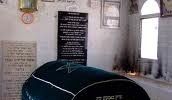Habakkuk’s Tomb
October 21st 2014
Some Biblical prophets, like Moses and Jeremiah, are pretty well-known, even among people who are not Biblical scholars. Others, like Habakkuk, who lived in the Jerusalem area of ancient Israel approximately 2,700 years ago, are much less well-known.
In the Jewish Bible, the book that bears Habbakuk’s name has just three chapters. He is the eighth of the Twelve Minor Prophets whose works are compiled together. In total, his recorded prophecy includes a song of praise to God and five separate prophecies about the nearby Babylonian population, among whom the Israelites were to be exiled after the destruction of King Solomon’s Temple in Jerusalem. The theme of Habakkuk’s prophecy is absolute faith in God. We don’t know too much about Habakkuk as a man.
The tomb of this mysterious ancient prophet is located northeast of the Kinneret (Sea of Galilee), approximately six miles south and west of Safed. Visitors today come to pray at the tomb and have been known to leave small notes, on which they have written personal prayer requests, in the cracks of the walls of the tomb, much like at the Kotel in Jerusalem, or in openings in the trunks of the hearty old trees outside.
Like many burial places of particularly noteworthy Jewish people around the world, the tomb of the prophet Habakkuk is enclosed by a small building. The tiny structure, no bigger than an average bedroom, is surrounded by the old trees into which people tuck their prayers. The stone building was constructed in the 20th century in order to protect the tomb. The most distinctive feature of the building is its turquoise dome. The tomb itself, covered with a blue velvet cloth, is in the center of the building and stands approximately four feet high. A small wooden bench is available for visitors who would like to linger.
For the past 900 years, visitors have taken it as a matter of faith that this is the location of Habakkuk’s actual tomb. Scholars have suggested that it’s actually the burial place of an Arab sheikh from a place called Yaquq which sounds similar to Habakkuk. Nearby, archeologists have found additional burial places that date from the Second Temple period.












